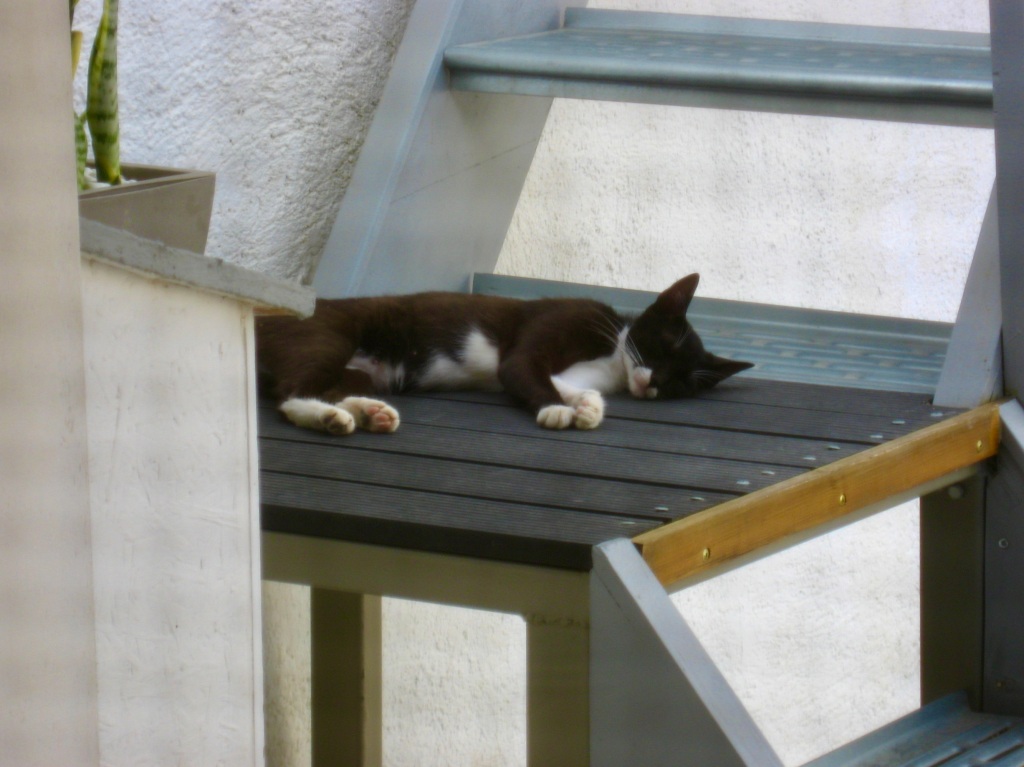
Cats, of course, are famously more independent than dogs, don’t require taking for walks and don’t wake up the neighbourhood in the dead of the night by barking for an hour without seeming to have any logical reason for doing so, apart – that is – from the desire to make sure that if they can’t sleep, then they’re going to make flippin’ sure that no one else does either. OK, yes, now and then a couple of local male cats will have a slanging match and go at each other hammer and tongs with their claws, but it doesn’t usually last long, although sadly it often results in the loser in the altercation coming off with a torn ear, or a nasty wound about its head or neck that would require a visit to the local A&E were it a human.
The beloved and I have always understood that to own a pet is a great responsibility, and it requires much sacrifice, which is precisely why we’ve spent most of our married life not owning one. In times past when my parents were alive we’d sometimes spend a few weeks back in the UK and to worry about what to do with a pet during that time was a principal reason why we decided against the whole venture. A couple of years ago however (and I know I’ve mentioned this before), a small black and white kitten (feral, of course) took to following me around the garden, to the extent that he quite stole my heart. The little perisher wheedled his way into our affections, so we started buying food for him and, before long, he’d well and truly got his paws under the table and was to all intents and purposes our cat. He lived with us for a couple of years while he grew into a formidable and handsome male, with a glossy coat and gentle disposition. We could do anything with our Mavkos, and he’d revel in the attention. Here are some photos of him, even though it still pains me to look at them (as I shall explain below) –
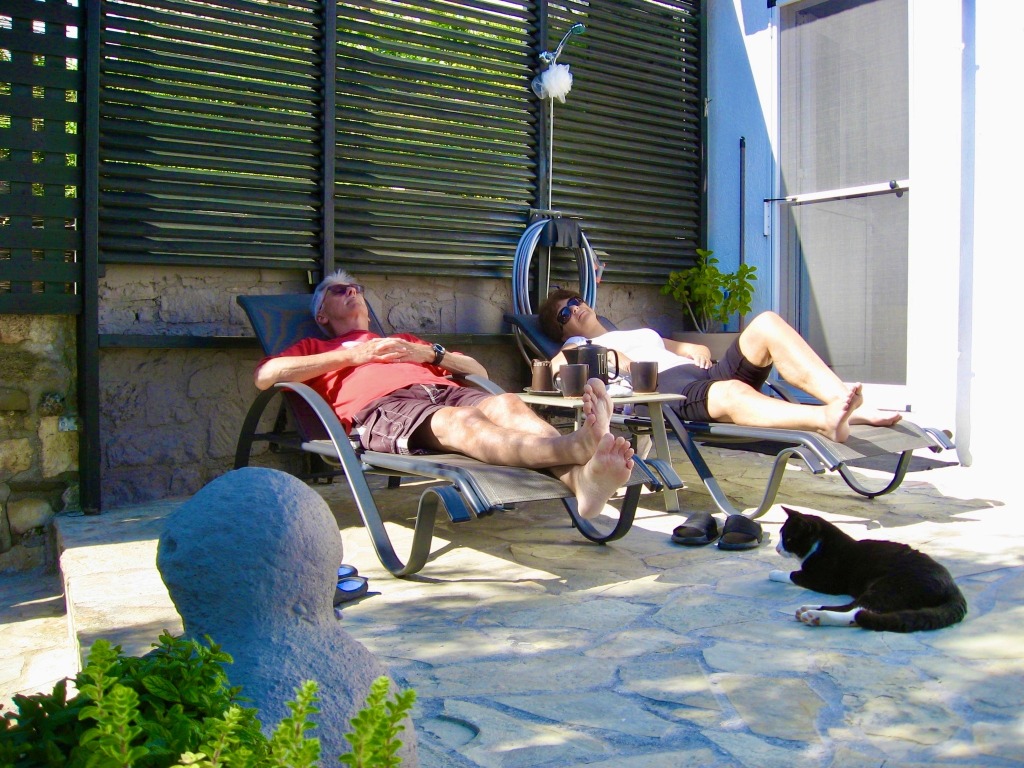
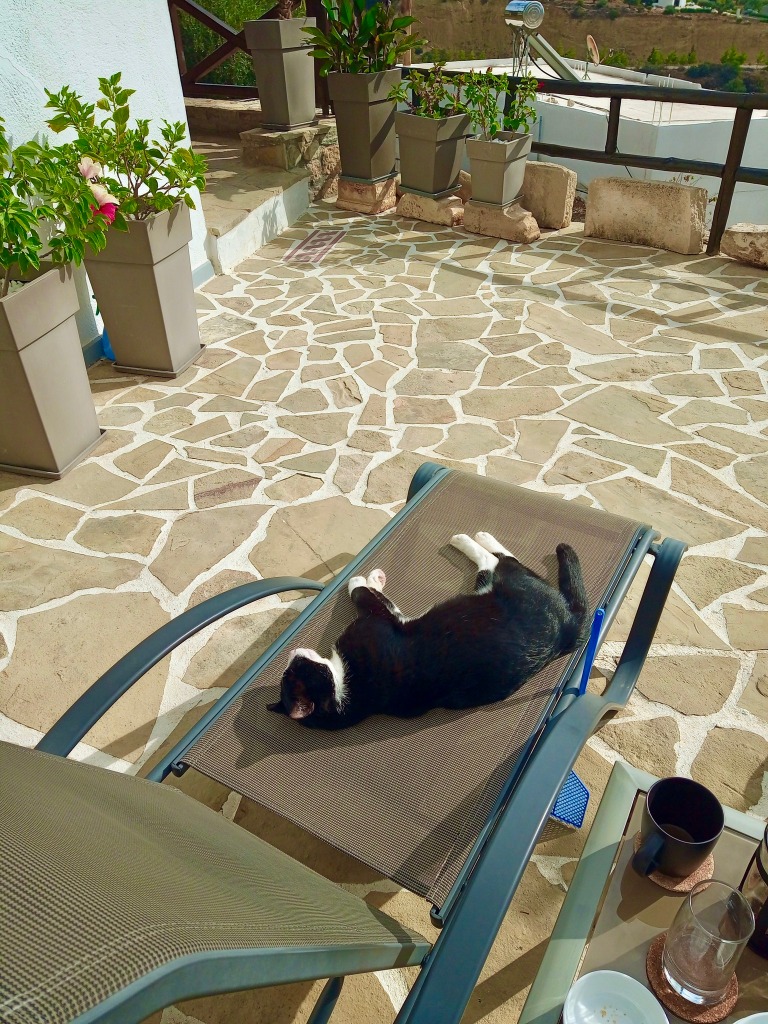
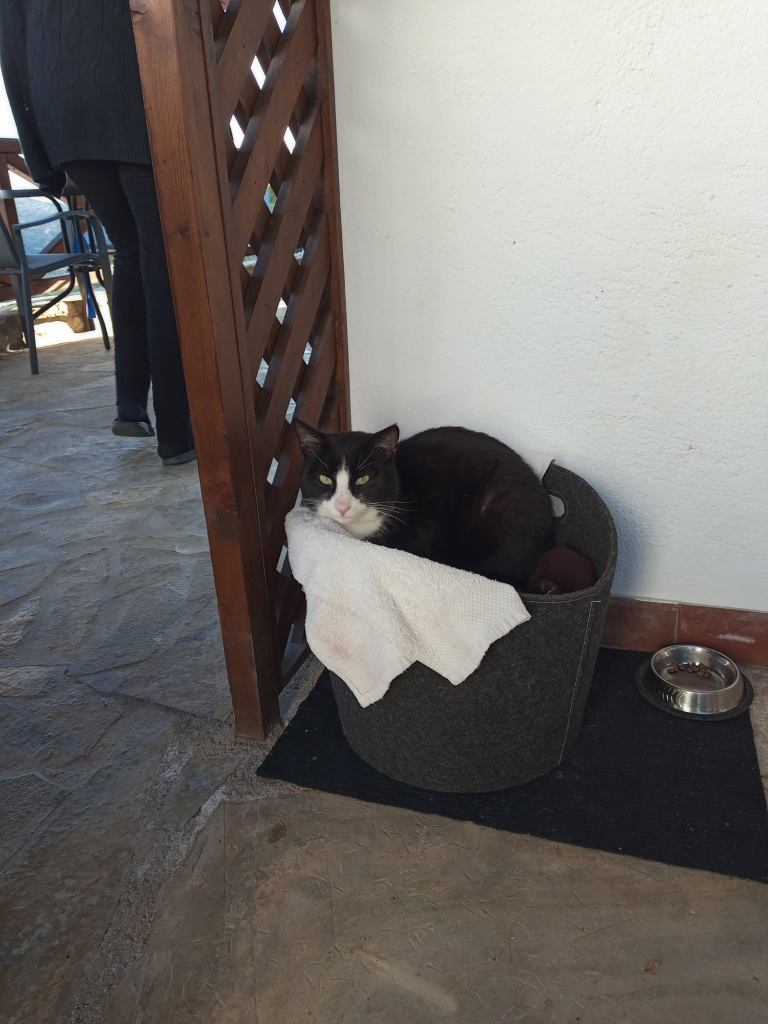

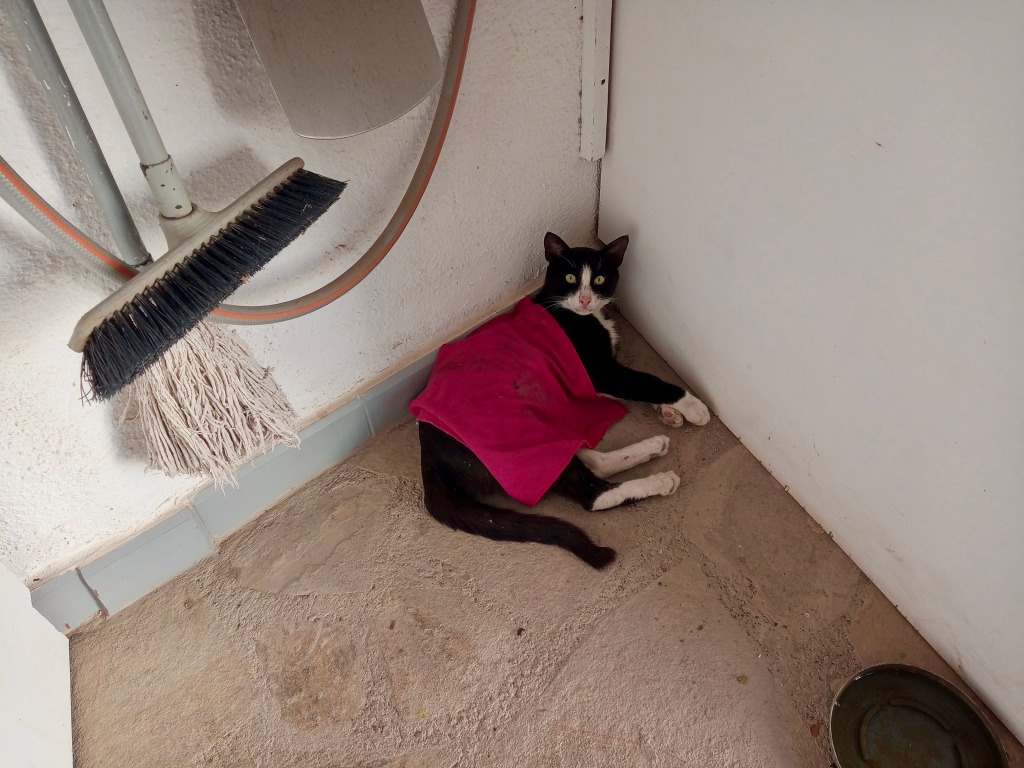
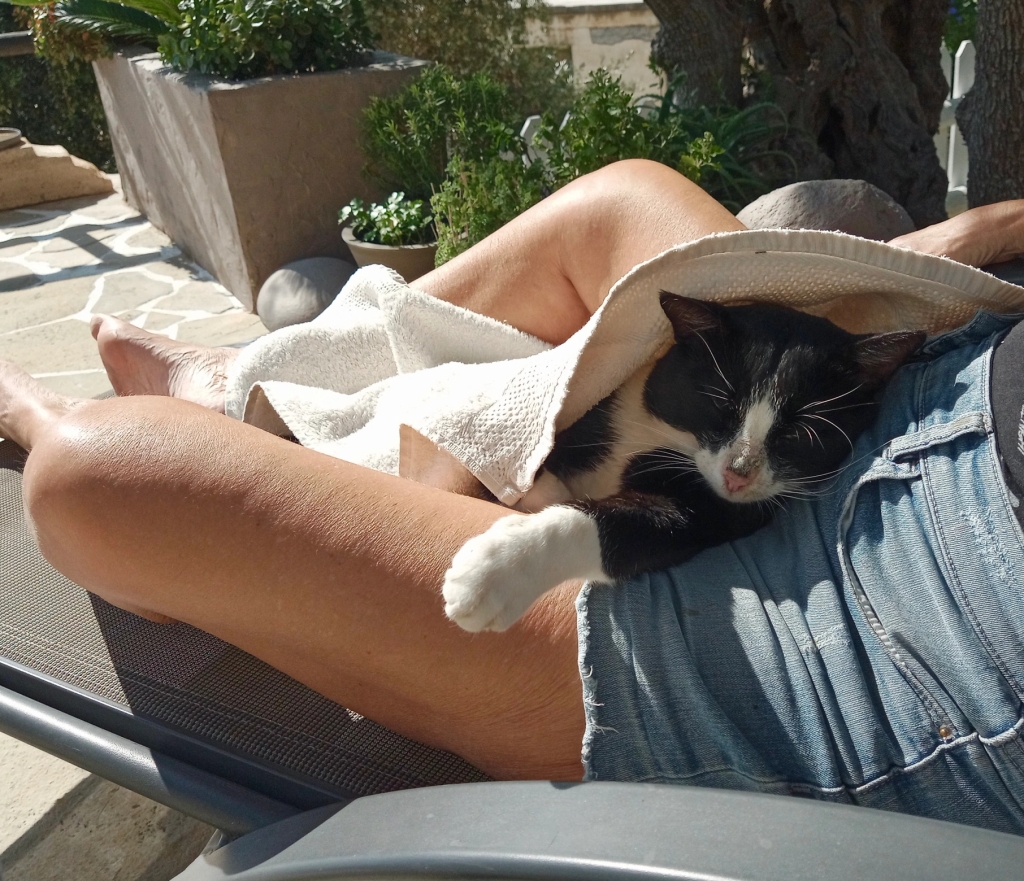
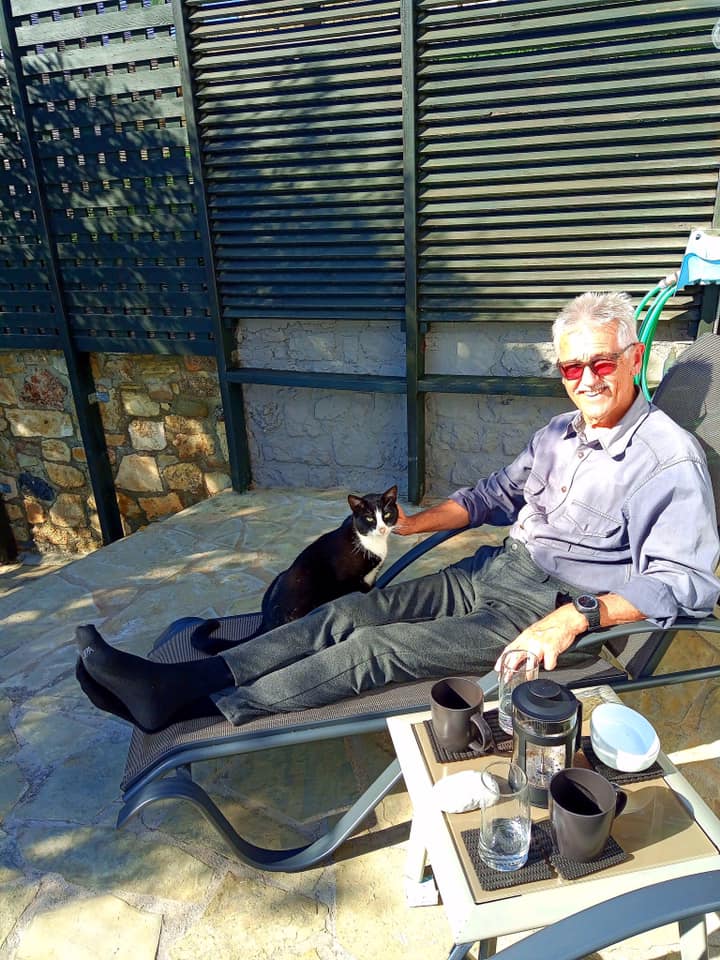
We became so soft on that cat that we’d also buy little packets of treats for him and he always knew exactly when it was time for coffee on the terrace. He might be nowhere to be found, but as soon as we opened that screen door with the tray in hand he’d come trotting around the corner of the house from the veranda and insist that he got his little dish of treats before ever we could settle down for our coffee. Once he’d finished his little dish of ‘nuggets’ as we used to call them, he’d sit there between our two sun loungers and look first one way, then the other, before deciding which of us would receive the privilege of having him curl up between our legs, his head on a human thigh, where he’d expect to be smoothed and tickled for half an hour or so.
Then, one day, about a year ago now I suppose, he started with his absences. At first he’d be gone for four or five days, then turn up like butter wouldn’t melt, usually around coffee time, and expect his treats and cuddles quite as usual. These absences gradually increased in length and we were sure that he’d found another house in the village where they’d taken to this amazingly affectionate cat that was obviously at home around humans and begun feeding him there too. Frankly, we were OK with this because the first time we’d been away while he was ‘our cat’, as it were, we’d enlisted the help of Angla’i’a to come and feed him while we were away. She’s no longer in a position to do that, because her legs won’t get her up the fifty metres or so of our drive any more, it’s simply too steep for her. So to be able to go away and not have to worry about Mavkos was a blessing.
The problem was, and anyone who knows cats will also know this, you never really own a cat, it’s more that he or she deigns to live with you. It seems to me that loads of cats the world over have more than one home, often without the original owner ever finding out. Back on Rhodes we’d hosted our neighbours’ cat each time they’d gone to the UK for a month or so each spring. The cat was called Simba and wasn’t even originally theirs to begin with. He’d moved in with the couple who’d bought the house that was built above and behind their place, and had belonged to Nicola, the new resident there. The trouble was, the more dogs that Nicola adopted, the more time Simba would spend on Ron and Janet’s terrace with them until, inevitably, he decided to throw his lot in with them to escape the hassle. When they went away he’d move effortlessly down the hill to our place and was effectively our cat for the duration of their absence. When Ron would come home he’d be very keen to collect Simba, since he’d missed that cat terribly. It’s not surprising really, because he and Simba were virtually inseparable all the time that Ron was at home. Simba would follow him all around the garden, sprawl on his lap while Ron read the papers on his Kindle device during the daytime and flop onto the sofa with Ron of an evening. When they got back to Rhodes from the UK, the simple act of Ron carrying Simba back up the hill to their terrace was the signal for the cat to return home, whenceforth it would be our turn to miss him for a while!
So, with all the above in mind, you’ll understand how we felt when Mavkos simply didn’t come back any more. Simba had disappeared a couple of years before we left Rhodes, and when he first went away Ron was beside himself. He’d wander the dirt tracks and forest trails around the house calling for the cat to come home, but he never did. There were no other houses within a sensible distance for a cat to relocate to when we lived in Kiotari, so we had to conclude that one of two things had happened to Simba. Either he’d been poisoned (a regular and barbaric habit of some of the locals in rural areas around the Greek islands), or, somewhat like an elephant, Simba had known that he was unwell and was going to die, and so went off to curl up in some concealed nook somewhere to go to sleep for good.
Once it had become apparent that we were to experience a similar loss with Mavkos, I ended up really identifying with Ron and how he’d felt at the loss of Simba. In fact on more than one occasion I scoured the village hoping to find where he’d decamped to with the idea of trying to coax him home, or at the very least making sure that he was happy and well cared for. No joy.
Mavkos came back just one more time, after a gap of about three months. At least we were relieved to see that he was OK physically and seemed to be well fed. He turned up right on cue as we were settling down to sip our iced coffees on the terrace one morning, only we didn’t have any packets of treats for him this time, so we fed him a few small chunks of Graviera (he loved cheese!). After that, he trotted off and we have never seen him since.
Our experience with Mavkos led us to decide that never again would we adopt a cat. To be honest, a lot of ex-pats take one look at a feral cat and decide, “Oh look! Isn’t he cute! Lets’ adopt him/her.” And they do. Unless you catch a feral cat at less than six months of age though, even though it can well acquire the habit of coming to you for food, it’ll never allow you to stroke it or pet it. After about 6 months it’s too late. After our own experience though, garnered over 19 years of living on a Greek island, we well understand how it is that lots of ex-pats end up caring for lots of cats, sometimes well into double figures. They simply look so cute. The fact is, though, that they are wild animals and their resemblance to the domestic cat is not really a good thing. As ferals they live off vermin and insects, and during the winter months they’ll eat vegetation too. When well-meaning foreigners turn up here and start feeding them cat food, they get lazy and no longer have to go hunting for rats, mice and lizards on which to survive. I once watched a feral cat on Symi chase down and devour a Symi spider, and it was not a pretty sight. That said, it was however somewhat reassuring, because if you’ve ever seen a Symi spider (and I talk about them quite a bit in my ‘Ramblings From Rhodes’ book series) then you’ll know that for the arachnophobe they’re a total nightmare. They’re easily as big as a tarantula and when one walks across the path that you’re following you hang back out of respect and let it go its way. We’ve stayed in various accommodations on Symi and once or twice had to deal with one of these monsters and it’s a daunting task, I can tell you. So, to be aware that the feral cats eat them is comfort indeed. But then, if those cats are used to being fed by well-meaning (although IMHO missguided) ex-pats, then they’ll have no need any more to hunt down their food. They thus become part-domesticated and the vermin population of the area prospers.
So, determined as we are not to become owners of another cat, you can understand how hard is our internal battle not to get too soft on White Sock, Groucho, Woebegone and Ginge, the ferals that regularly hang around our door when we’re pottering about at home. See, even to have given them names is to almost lose the battle, I know. It’s White Sock who’s dozing on the steps up to our upper garden in the photo at the top of this post. It’s also him staring in through the mozzie screen of my office while I write upstairs in the first shot below. There’s cunning old Ginge in the second shot below, scoffing a little food that we, in a moment of weakness, put out for him…

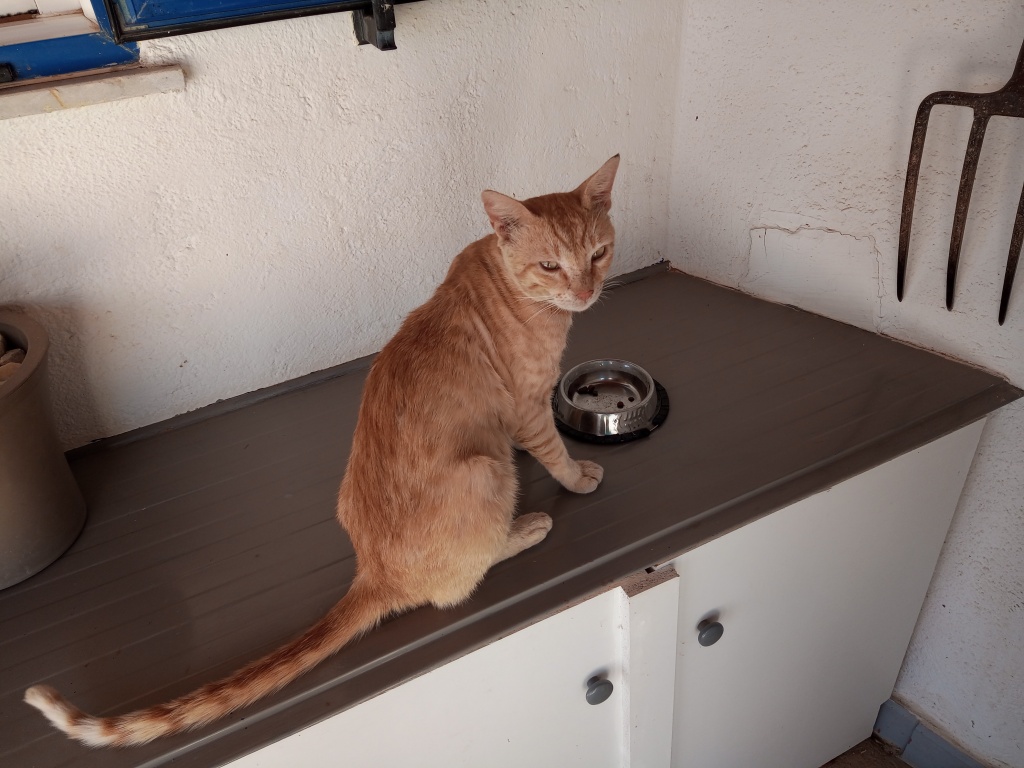
Here’s Groucho, the crafty little…
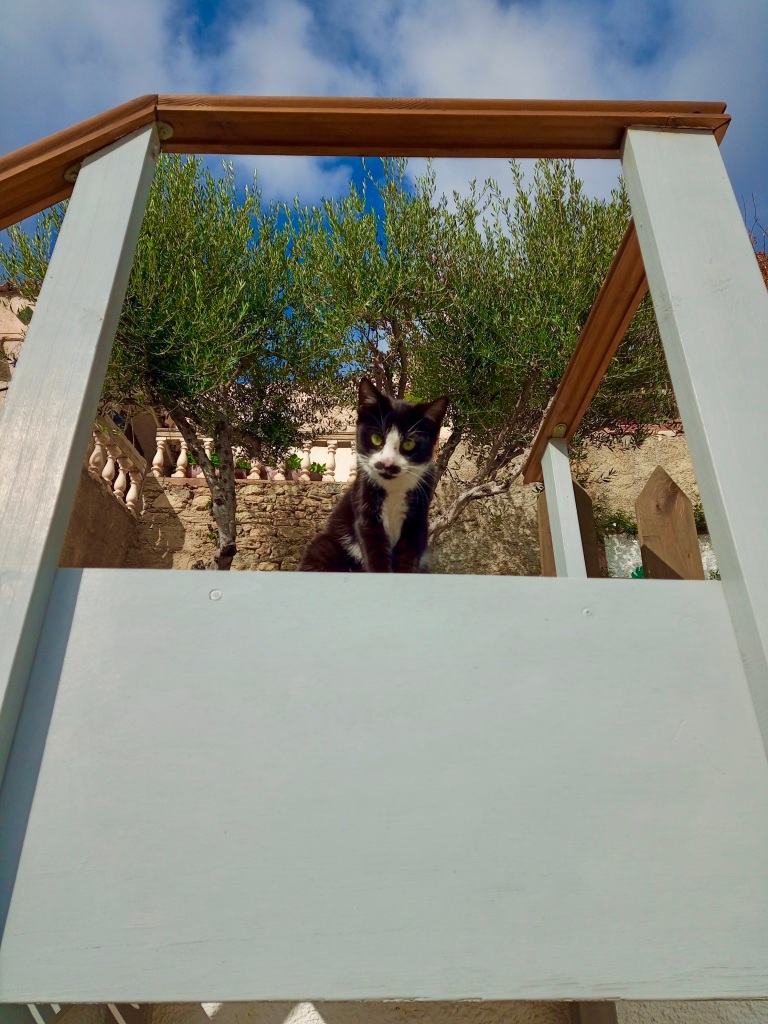
I don’t have a photo of Woebegone, so-named because he always looks like he has the cares of the world on his shoulders. Don’t let anyone tell you that cats can’t show feelings in their facial expression. Woebegone has a way of looking at you that says, “Poor me. No one loves me and the other male cats always pick on little old me.” It’s true, I tell you.
So, here’s the situation at present as I see it. Those puddytats mentioned above by name we do occasionally put food out for. What we are determined not to do though, is to feed them daily. That would be the beginning of enslavement, and we’re not prepared for that. Plus, we shall be going to the UK in September, and we don’t want them to suffer on account of our absence. It takes nerves of steel, I can tell you, not to rush to the cupboard and pour some cat food into a dish when Ginge is meowing at the front door, but it’s for his own good. Once you learn to be firm, you soon notice too that the cats don’t starve. None of them turns up looking emaciated, so they do OK. They’re first of all feral cats and must be allowed to remain so.
Dammit, Ginge even wants to be smoothed now. Courage, John, courage!!
•
Click HERE to go to my Amazon Author Page. There you can browse all of my written works.
